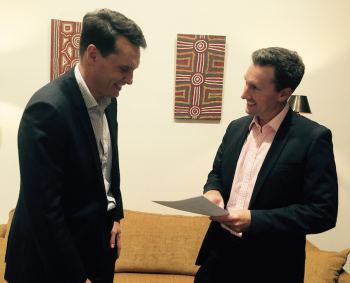
The people behind the process
This month, I talk to Stuart Jackson, Senior Analyst for The Montgomery Fund who recently joined us from a long career at JP Morgan (formerly Ord Minnett) where he was most recently Deputy Head of Research.
Profile: Stuart Jackson
What initially drew you into funds management and in particular equity analysis?
It really goes back to school days and in particular Year 11 where I studied economics and my initial interest came from the macro economic side of things. I also followed the financial press a bit during this time. I then went to the University of Melbourne and studied Commerce where I also picked up an interest in microeconomics. I completed an honours year and then got picked up by BT Funds management straight out of uni. I initially ran the cash book in the fixed interest funds but soon transferred into the Australian Equities team and from there I discovered a love of businesses and understanding what drove value creation within different businesses and hence long term share prices.
What makes a successful investor?
The first thing is discipline. There is a lot of noise generated by market commentators on a minute-by-minute basis that can distract many investors. One needs to focus on the important issues that really drive value within businesses and not be swayed by short-term emotional urges or superfluous distractions.
What is the best piece of advice you have been given?
It probably harps back to my first job, where one of my bosses told me that it doesn’t matter what you’re doing, just remember that everyone is just trying to do a job. This has keep me somewhat grounded throughout my career and I’ve always tried to treat people with due respect even when I’ve been in a position of power.
What is the biggest mistake that most investors make?
Well, it goes back to what I said previously about discipline and being able to divorce yourself from the 24 hour news cycle and the resulting urge to react to your emotions.
Given your last career focus was in “sell side” equity analysis, can you tell me what that involved and what the key differences are between “sell-side and buy-side equity analysis”?
There is a lot of commonality between both sides of equity analysis. I would say the biggest difference is that on the sell side, i.e. generating research recommendations under a brokerage firm, then it is not so much the end recommendation that is valuable to clients but the ability to provide in-depth information and understanding for the buy side to make their own assessment. It also means that you need to be across a lot of topics in a lot of detail as the client’s needs are very broad, as opposed to the buy side where the information you require for your research is specific to your investment process. Another key difference on the buy side is that you are dealing with the corporates on a daily or weekly basis, you deal with the investment banking division a lot more and you spend a lot more time trying to sell your “research and information” to clients, which is not the case on the buy side.
What worries you most about investing at the moment?
From a long-term perspective it is probably a reversal in the long term duration risk. What I mean here is that for the last 30 years we have had interest rates falling, which has supported upward moves in equity asset prices for a given level of income. We’ve now had several years of almost zero interest rates in developed markets and I’ve seen what happens to asset prices when there is a long term upward move in risk free assets, as evidenced by the 1960’s to 1980’s period and it does not bode well for risk assets. In that situation you need to be very focused on value and what you are prepared to pay for those assets.
If you weren’t an equity analyst, what would you most likely be doing?
Given my current skill set and experience I would probably be a in a strategic management role, most probably a CFO type role. Although when I was at school I did consider doing medicine.
What do you do in your spare time?
I’m a part time chauffeur for two children…. unpaid! When I do get a moment to myself though I do like to play a bit of golf, cycle or go to the beach.